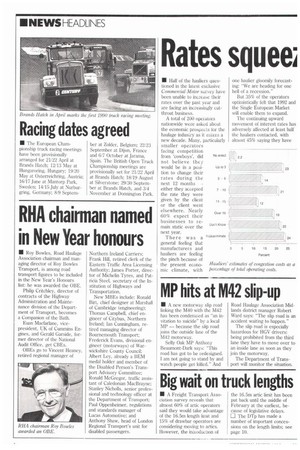Rates squee; for hauliers in 1990
Page 6

Page 7

If you've noticed an error in this article please click here to report it so we can fix it.
• Half of the hauliers questioned in the latest exclusive Commercial Motor survey have been unable to increase their rates over the past year and are facing an increasingly cutthroat business.
A total of 200 operators nationwide were asked about the economic prospects for the haulage industry as it enters a new decade. Many, particularly smaller operators facing competition from 'cowboys', did not believe they would be in a position to change their rates during the next 12 months either they accepted the rate they were given by the client or the client went elsewhere. Nearly 60% expect their businesses to remain static over the next year.
There was a general feeling that manufacturers and hauliers are feeling the pinch because of the present economic climate, with one haulier gloomily forecasting: "We are heading for one hell of a recession."
But 35% of the operators optimistically felt that 1992 and the Single European Market will enable them to expand.
The continuing upward movement of interest rates has adversely affected at least half the hauliers contacted, with almost 45% saying they have been forced to cut back on investment plans.
Small firms in particular find themselves exposed to interest rate pressures, and some admitted they were not sure whether they would still be in business by the end of 1990.
All respondents agreed that traffic congestion added a considerable amount to their operating costs, voicing complaints not only about the amount of traffic on the road, but also about the quality and efficiency of the road network. Operators said they had to send vehicles out hours earlier to be sure of delivering on time and almost 14% believe this sort of timetable modification adds more than 15% to costs.
One Hampshire operator felt he was losing two days a week because of congestion, caused mainly by roadworks, while a Midlands haulier estimates his operating costs have risen by 30% because of congestion problems.
Competition appears to have increased over the past year, especially at local level, according to 440/c of operators. Those who specialise reckon they are better placed to survive in the
market. Some feel competition is "always fierce," while others commented that "too many people are coming into our field of work, making life difficult".
One Cumbria haulier felt that, on a local level, competition is decreasing because owner-drivers cannot compete any more with the depressed rates, and are pulling out.
Operators were asked about how the poll tax would affect their rates bill over the next year, and most admitted they had not got a clue. Over 7% of those prepared to make a guess estimated rate rises of U p to 20%.
Operators were not overconcerned about the prospect of finding sufficient skilled staff this year. With a great number of smaller companies going to the wall, many felt there is an ever-growing reservoir of employable drivers with full HGV 1 qualifications. Some respondents, mainly from family firms, said they kept a skilled team happy by paying decent wages and fully utilising the apprenticeship scheme.
The 30% who did expect recruitment problems cited the state of training courses as being the major offender in releasing newly-qualified but inexperienced drivers. Agencies came in for some criticism with some operators accusing them of charging a lot more than firms were prepared to pay.
Sixty seven per cent of hauliers questioned had not developed any strategy to deal with 1992 and the single market, despite warnings by some sectors of the industry not to become complacent about the changes.
Many felt that, because they were not involved directly with Europe, it was not necessary to consider the issue, while others said they were preparing to meet the challenge of foreign competition head-on by specialising, enlarging their European operations and setting up offices abroad.
No one area of the haulage industry stood out as the business with the best prospects of growth in 1990. Over 10% of operators believe refrigerated contract work will be a boom area, followed by 8% who thought specialised haulage (timber, nuclear fuels, express parcels) could be the businesses to get into.








































































































